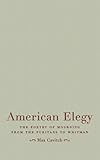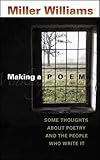American Elegy: The Poetry of Mourning from the Puritans to Whitman
American Elegy: The Poetry of Mourning from the Puritans to Whitman

The most widely practiced and read form of verse in America, “elegies are poems about being left behind,†writes Max Cavitch. American Elegy is the history of a diverse people’s poetic experience of mourning and of mortality’s profound challenge to creative living. By telling this history in political, psychological, and aesthetic terms, American Elegy powerfully reconnects the study of early American poetry to the broadest currents of literary and cultural criticism. Cavitch begins by considering eighteenth-century elegists such as Franklin, Bradstreet, Mather, Wheatley, Freneau, and Annis Stockton, highlighting their defiance of boundariesâ€"between public and private, male and female, rational and sentimentalâ€"and demonstrating how closely intertwined the work of mourning and the work of nationalism were in the revolutionary era. He then turns to elegy’s adaptations during the market-driven Jacksonian age, including more obliquely elegiac poems like those of William Cullen Bryant and the popular child elegies of Emerson, Lydia Sigourney, and others. Devoting unprecedented attention to the early African-American elegy, Cavitch discusses poems written by free blacks and slaves, as well as white abolitionists, seeing in them the development of an African-American genealogical imagination. In addition to a major new reading of Whitman’s great elegy for Lincoln, “When Lilacs Last in the Dooryard Bloom’d,†Cavitch takes up less familiar passages from Whitman as well as Melville’s and Lazarus’s poems following Lincoln’s death. American Elegy offers critical and often poignant insights into the place of mourning in American culture. Cavitch examines literary responses to historical eventsâ€"such as the American Revolution, Native American removal, African-American slavery, and the Civil Warâ€"and illuminates the states of loss, hope, desire, and love in American studies today. Max Cavitch is assistant professor of English at the University of Pennsylvania.

List Price: $ 67.50
Price: $ 67.47
Making a Poem: Some Thoughts About Poetry And the People Who Write It

"We need poetry as we need love and company," according to Miller Williams. Making a Poem< speaks to us allâ€"those of us trying to write a first poem, those who have published volumes of poetry, and anyone who cares how the world and language fit together. Distinguished as a poet, a teacher, a scholar, and a publisher, Williams traverses a wealth of topics. He explores poetic techniques of line break, rhythm, and meter, and the development of verse forms. In our technological age, he makes clear that poetry is essential to the human soul, showing the connection between scientists and humanists. Williams draws from experience to describe the importance of teaching poetry to prisoners and the value of the university and the small press in fostering poetry and the relationship between writer and editor. Making a Poem is an intimate, conversational treatise on poetry by a man of letters with decades of practice in both the business and the craft of verse. Readers will take away from this delightful book a deeper appreciation of the poet's art and the vital role poetry can play in their everyday lives. AUTHOR BIO: Miller Williams is the author, editor, or translator of thirty-three books, including fourteen volumes of poetry and Patterns of Poetry: An Encyclopedia of Forms. Among his many honors are the Amy Lowell Traveling Scholarship in Poetry from Harvard University, the Poets' Prize, and the Prix de Rome for Literature and the Academy Award for Literature, both from the American Academy of Arts and Letters. He was inaugural poet for Bill Clinton's second swearing-in as president. Williams took academic degrees in the sciences because a college counselor told him his entrance tests indicated no verbal aptitude. As a young man he played the clarinet and saxophone in a jazz combo. He is the father of three-time Grammy Awardâ€"winning singer and songwriter Lucinda Williams.

List Price: $ 18.95
Price: $ 9.75
No comments:
Post a Comment